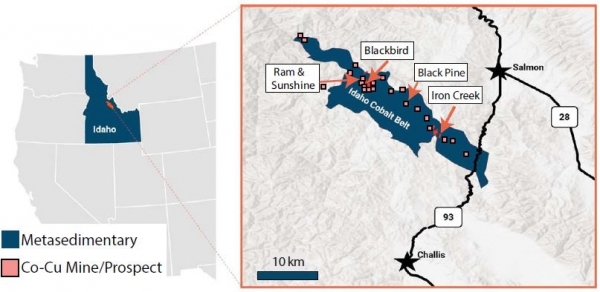A new study published in Geology evaluates the potential for cobalt extraction from the Idaho Cobalt Belt (ICB) of east-central Idaho, using a detailed study of the Iron Creek deposit. The ICB hosts the second largest known domestic resource of the critical mineral cobalt, one of the key ingredients in many rechargeable batteries needed for the green energy transition. Demand for cobalt is projected to increase more than 500% by 2050. Roughly 70% of the cobalt mined globally is from the Democratic Republic of the Congo, where mining practices have been criticized for human rights violations including hazardous working conditions, child labor, and human trafficking. The Biden administration has prioritized increasing the domestic production of critical minerals in the United States, invoking the Defense Production Act in 2022 to increase mineral development, and generating renewed interest in the ICB.
Understanding the mineralogy of the Iron Creek deposit is core to evaluating the amount of cobalt and other critical minerals that could be extracted from the site, and what methods are best for processing the ore. Cobalt was mined intermittently in the ICB during the 1900s, and the Blackbird Mine was designated as a Superfund site by the U.S. Environmental Protection Agency after closing. In 2022, the Australian mining company Jervois commenced mining at another site in the ICB. The Canadian company Electra Battery Materials has been exploring the Iron Creek deposit.
The rocks at Iron Creek are metasedimentary rocks of the Apple Creek Formation in the southwest Belt-Purcell Basin. The rocks of the Belt-Purcell Basin, which stretches between the U.S. and Canada, are more than one billion years old and have historically been mined for lead, zinc, silver, copper, cobalt, and gold.
Read more at Geological Society Of America
Image: Iron Creek deposit location, Idaho cobalt belt (Electra Battery Materials, 2022)


